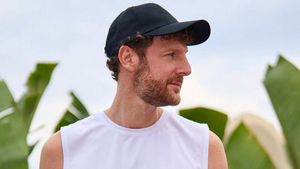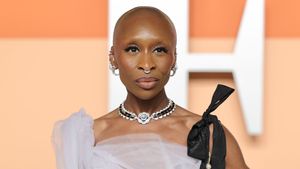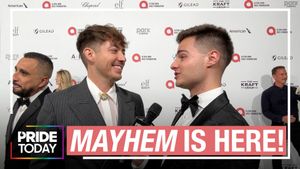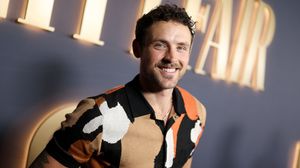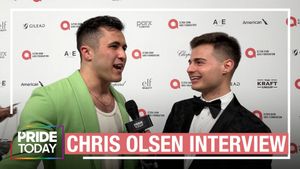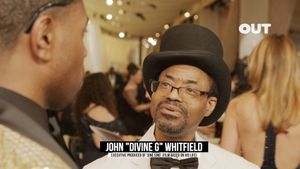
Karamo Brown is perhaps best known to a generation of television viewers as the first gay African-American man to appear on MTV's The Real World. From September 2004 to March 2005, audiences tuned in weekly to see the Houston-born nonprofit worker who expressed controversial views on race and upended many stereotypes of what it means to be a young gay man in America.
Among those viewers was a boy he didn't know -- Jason Brown, who first got to know his father though watching episodes of the MTV reality show. But Karamo would not learn of his son's existence until two years later, when fate arrived on his doorstep in the form a stack of papers demanding overdue child support.
After reading the papers' contents, the gay former reality star was naturally confused.
"At first, I thought I was on the MTV show Punk'd," Brown says, referring to the show that played practical jokes on celebrities. He remembers thinking at the time, I had way too many penises in my back pocket for me to have a baby now.
But a call to the Texas attorney general's office revealed the impossible to be true: He had a son. The mother, a friend from his youth, had moved away from their high school at the age of 15, shortly after becoming pregnant. Confused and lacking guidance from her family, she made the decision to keep the identity of the child a secret from the father.
In fact, Brown may never have discovered that he was a father had the mother not applied for benefits from the state. Officials had tracked him down and mailed him paperwork as a matter of process. But they would not disclose the location of the mother and child to Brown over the phone. And so Brown found himself on a flight from Los Angeles to Texas in order to track down and meet his son.
He succeeded. Obtaining permission from the mother, he met and bonded with his son Jason, 10 years old at the time, and received custody of him that year, 2007. And no one could have been more overjoyed than Brown and his family.
"Every single person was over-the-moon elated," Brown says. "At the time, there seemed no possible way I was having a child ... unless I adopted later in life. And being a boy, I think everyone wanted for me to carry on the name. They were all over the roof, especially my father."
 Karamo and his oldest son, Jason Brown
Karamo and his oldest son, Jason Brown
Brown had never been on the best of terms with his father, a Caribbean-born accountant who had voiced his homophobia throughout Brown's youth. Though Brown began self-identifying as gay as a teenager, he knew he could never show his true self to his dad while they were living under the same roof.
"I could never have come out to him, because my life would be in danger," Brown remembers. "The minute I got out of his house ... I never looked back, and started living the rest of my life fully."
His life now revolves around Jason and Chris, Jason's half brother, whom Brown adopted in 2010 in order to keep the siblings together. After the adoptions were completed in Texas, the trio moved back to Los Angeles in 2011.
Brown says that, though unexpected, fatherhood was the best thing that ever happened to him.
"People say, 'You saved his life,'" he remarks about his oldest son. "And I say, 'No, he saved mine.' Because once I saw that there was somebody else out there, it made me immediately start work on myself, because I wanted him to have a better relationship [with me] than I had with my father."
Brown admits that his life post-Real World and pre-fatherhood had been a mixed blessing. The experience of being a gay black man on national television had caused "turmoil" within his family, especially with his father, who he cut out of his life for over a decade. He also found himself swept up into the darker shadow of fame -- parties, drugs, alcohol, and "all those things he had never been exposed to" prior to being in the limelight.
But he quickly saw that just by being visible to the public, he had accomplished something extraordinary.
"I realized how impactful just me being me was and how many people needed to see me," he says. "And to this day, I still have people who tell me, 'I needed to see you, because it's the only time I've ever been represented.'"
 Right: Karamo and youngest son Chris
Right: Karamo and youngest son Chris
Today, Brown receives similar remarks from people who continue to be inspired by his role as an out African-American dad. Brown himself says he is a different person since learning he was a father. He no longer consumes drugs or hard alcohol, and he has created a game plan for success in the entertainment industry.
Recently, he has made great strides toward this goal, appearing as a television personality on HLN's Dr. Drew on Call, where he is a nightly guest contributing host, and YouTube's The Young Turks. He recently wrapped his third season as host of The OWN Show on Oprah.com. In his free time, he volunteers as a youth counselor at the Los Angeles LGBT Center.
Still in his early 30s, he is a millennial multihyphenate who will soon add the role of producer to his list of accomplishments. He has already launched a production company, with several scripted and nonscripted projects in development.
Naturally, there have been difficulties along the way. He had to rebrand himself, showing he was not the crazy kid from The Real World but a responsible adult. Brown remembers the experience of viewing a portion of his life on television and how initially difficult it was to match the person on the screen with who he thought he was and should be.
"It was hard for me to watch, because that guy is not who I see in my head. But clearly, this is what the rest of the world is seeing," he remembers. But he says he has "no regrets. Those experiences made me the man I am today. They were lessons I needed."
"Most people don't remember the guy from The Real World," Brown says of himself today. "They know the guy who is a professional, a father, and a friend that gives great advice."
And advice is exactly what Brown plans to give. After searching for literature that would offer guidance to single gay dads and not finding much, he has set out to write a book about the surprises and obstacles he has encountered along the way. He hopes the book will help others navigate the largely uncharted waters of LGBT parenthood.
"There's a lot of 'how to adopt' books, but there's no practical resource for say, school supplies," Brown says, which he says can cost the novice shopper a small fortune. He now counts clipping coupons, navigating "Where's the mother?" inquiries at PTA meetings, and readying family trips to the Six Flags Magic Mountain theme park as among the skills he is eager to pass on to other gay parents.

Toward this end, he urges LGBT people who have the resources to consider adoption and discover, as he has, the joys of fatherhood.
"If you have the home, the finances, the open heart," then bring a child into your life, Brown says. "Don't be afraid, because there's some child out there who needs you, would love to be with you, and would complete your family. It's something I never expected, and I am so, so happy."
The positive change that Brown's children have brought to him hasn't gone unnoticed. About a year and a half ago, his own father couldn't help but express admiration at his son's newfound abilities and achievements.
"Wow. You're a great man doing great things," he told him at the time. It was a small gesture, and not enough to make up for a lifetime of difficulties. But Brown saw it as a step in the right direction.
"Everyone's on their journey," Brown says of his dad. "And he got there eventually."
And for Karamo Brown, it seems that journey is just beginning.
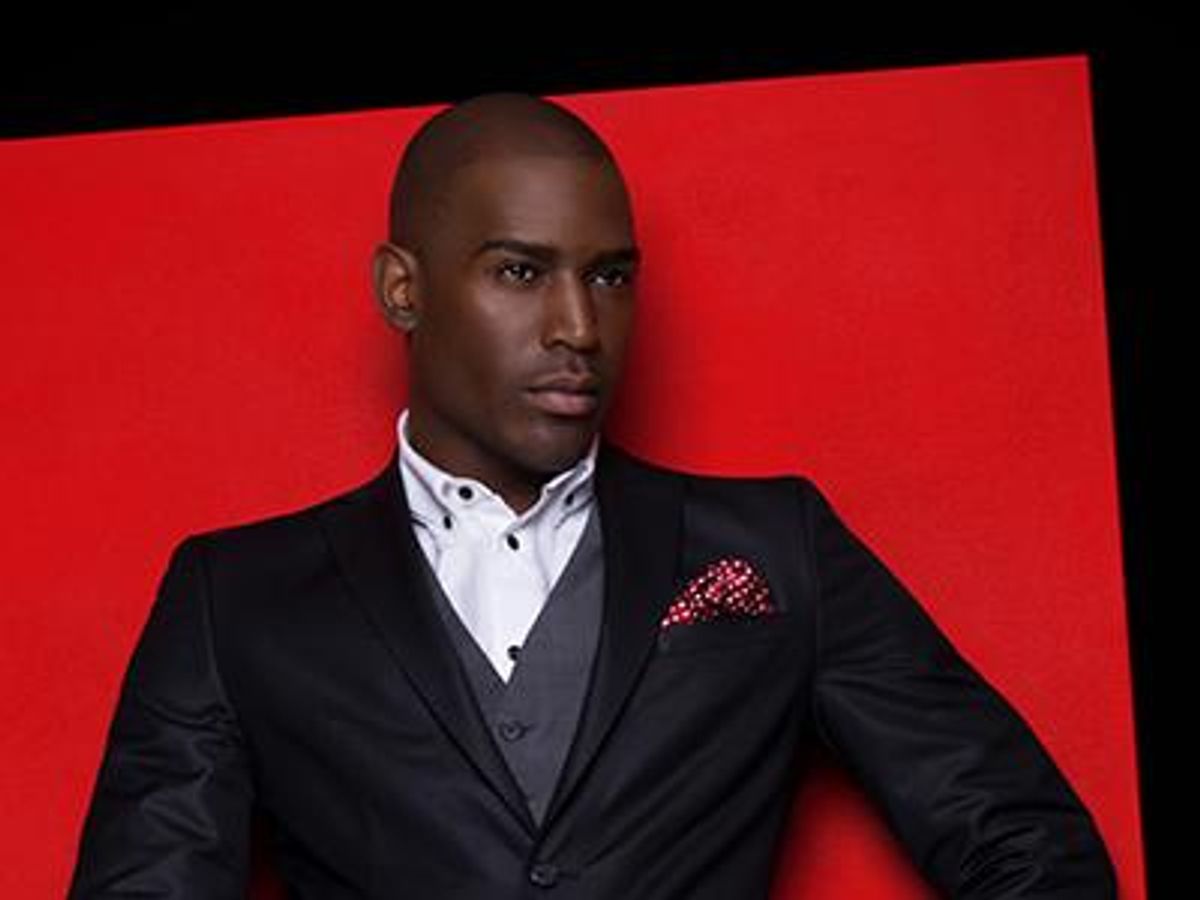









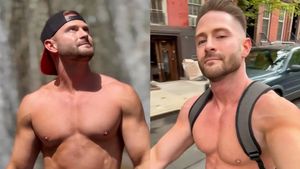

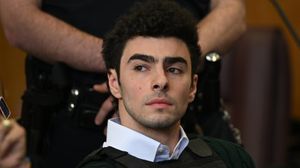




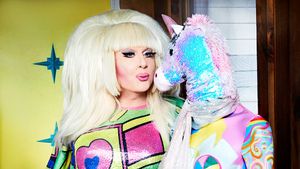




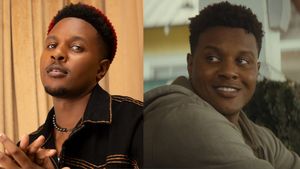




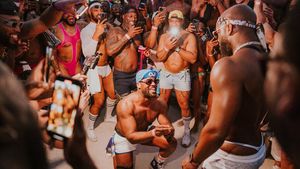





 Karamo and his oldest son, Jason Brown
Karamo and his oldest son, Jason Brown Right: Karamo and youngest son Chris
Right: Karamo and youngest son Chris

